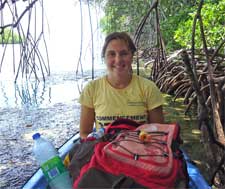 Ballston Spa, N.Y., resident aims for career as marine ecologist
Ballston Spa, N.Y., resident aims for career as marine ecologist
KINGSTON, R.I. – June 26, 2012 – Ryann Rossi always knew she wanted to be a marine biologist, ever since she proclaimed that sharks were her favorite animal at age 3. Now that the University of Rhode Island senior is getting her hands wet in the mangroves of Puerto Rico, she is even more convinced of her career ambitions.
“I started working on this mangrove project last summer, and I fell in love with the ecosystem. I absolutely love it,” said Rossi just days before returning to Puerto Rico to continue her research. “We don’t have anything like it up here. There’s just so much going on in mangroves.”
A native of Ballston Spa, N.Y., Rossi is collaborating with URI graduate student Brita Jessen on a nutrient enrichment experiment to assess how the mangrove ecosystem will fair with increased run-off from agriculture or urban environments.
“We want to make a flow chart of how carbon moves through this ecosystem, which is important for understanding climate change,” she said. “Mangroves sequester a lot of carbon by outputting it into tree biomass.”
To see how carbon sequestration may change under varying environmental conditions, Rossi and Jessen set up nine test plots on a mangrove cay in the Jobos Bay National Estuarine Research Reserve on the south coast of Puerto Rico. Since last summer, nutrients representative of urban and agricultural waste have been added biweekly to some of the plots. Then they collected leaves that fell from the mangrove trees to study their decomposition rate, measured tree growth, tracked algae blooms, and tested the chemistry of the water in the peat soil where the mangroves grow.
“We’ve even tied in some of the invertebrates that live in the mangroves,” Rossi explained. “There’s carbon in the leaf litter, and the crabs drag it down into their burrows, so we count the burrows and track how much leaf litter gets carried down them so we can see where the carbon is going.”
The researchers are just half way through their two-year experiment, and while they have collected a great deal of data, they still have to process the data before they can draw any conclusions.
“I have learned so much from this research,” said Rossi, “especially about field techniques and lab techniques that will be so important for my future career.”
Rossi’s research has been supported by the URI Coastal Fellows program, the Rhode Island EPSCoR Summer Undergraduate Research Fellowship and by grants from the URI Undergraduate Research Initiative and the Stan Cobb Marine Biology Fund Undergraduate Research Award.
A member of the URI Student Senate who teaches swim lessons in the campus pool, Rossi is looking forward to one more semester of classes before graduating in December. She then plans to enroll in graduate school with the goal of working as a marine ecologist.
“I love working in the field, where I get to enjoy nature and figure things out about nature, like why that crab is digging a burrow and how it affects everything else,” Rossi said. “Everything is connected, and I think that’s really neat.”

